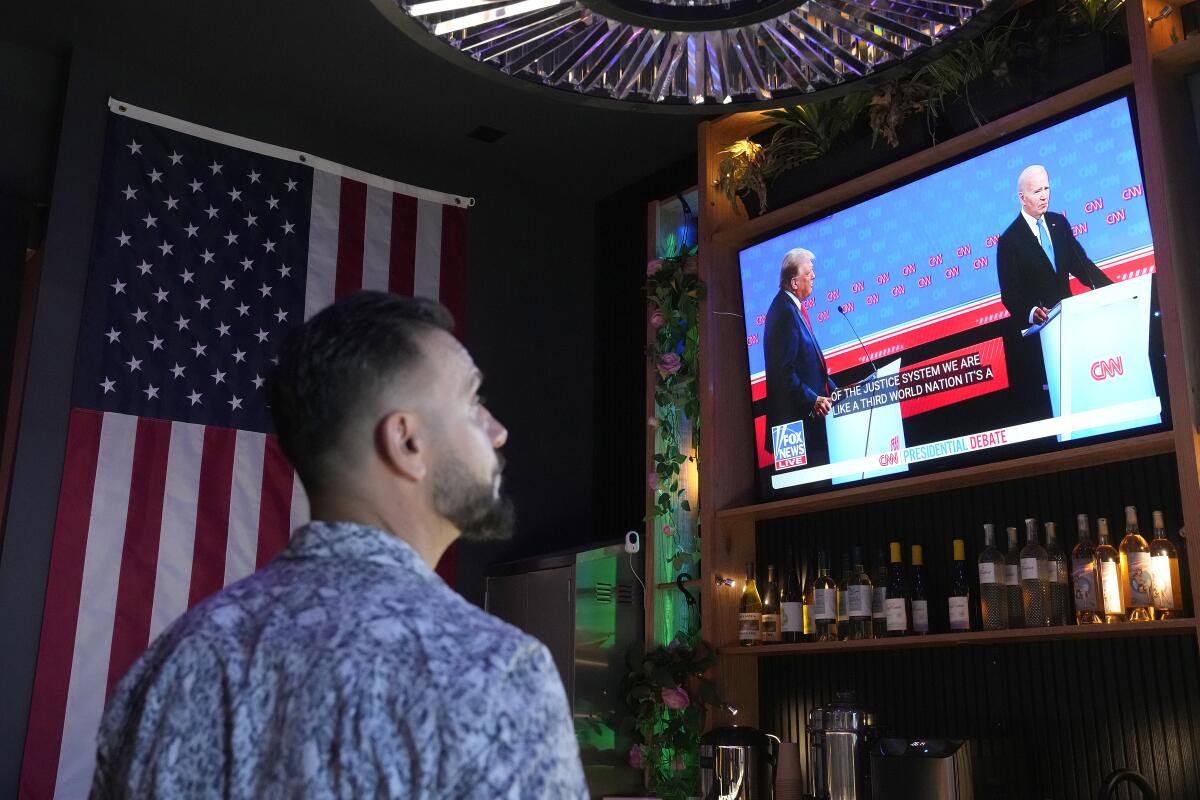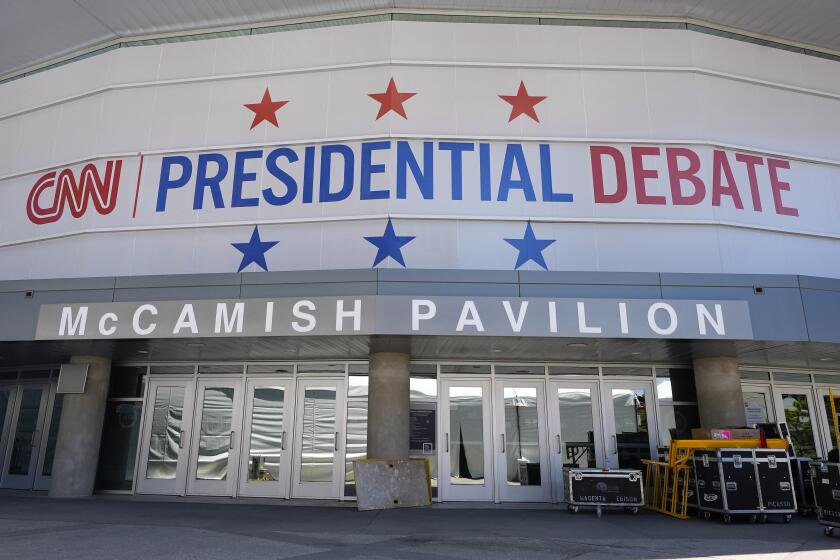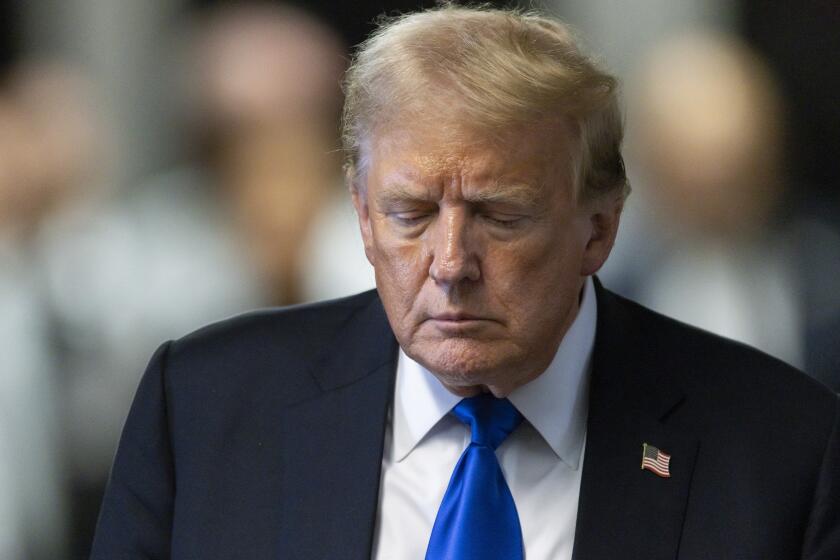Column: The debate showed Biden and Trump are terrible choices, but not equally terrible

Do not look away, America.
This is our own doing.
Opinion Columnist
LZ Granderson
LZ Granderson writes about culture, politics, sports and navigating life in America.
For four years, poll after poll suggested we did not want to see the matchup that we saw on the presidential debate stage Thursday night. And yet here we are, and now we cannot unsee it: Once again, our country’s choices for the presidency are Joe Biden and Donald Trump, and they were as bad as we knew they were going to be back when we could have stopped this.
Why did these two pitiful candidates emerge from our primaries? Partly because of the political machine. Partly because no Democrat with gravitas wanted to challenge the incumbent. And because there aren’t any remaining Republicans with gravitas.
Joe Biden beats Donald Trump hands down on the budget and the economy. Will the debate deliver the message?
Even before Thursday’s debate, I felt palpable nervousness in Washington this week as we all began to sense that the worse candidate (Trump) could prevail over the bad candidate (Biden). I was there as the White House opened its doors to the LGBTQ+ community in celebration of Pride Month, and with this close election looming, it was hard not to think this could be the last White House Pride celebration for a while.
If you think I’m being overly dramatic, remember the stakes.
Have you forgotten that one of the first things the Trump administration did on Day One was to start removing mentions of the LGBTQ+ community from government websites? Within hours, mind you, as if erasing queer folks were one of his top priorities.
A jury convicted the former president and presumptive Republican nominee on all counts in the New York hush money trial, a remarkable victory for the rule of law.
So yeah, many people attending this week’s ceremony were concerned about what a Trump victory would mean for our recently acquired marriages, the safety of our children, our employment and housing.
That’s what I was thinking about as I was coming to terms with the fact that America’s choices for president are between a very old man with a decent heart and a crazy old man with an axe to grind.
For the vast majority of us, that equates to picking the lesser of two evils.
But it’s not a close call for those of us who remember that past administrations have hunted down queer employees of the federal government and purged them from their jobs (the “lavender scare” of the 1950s, ’60s and ’70s). Or that the Republican administrations of the ’80s and ’90s let us die in the streets during the AIDS crisis. There aren’t two evils to consider.
There’s only survival.
The LGBTQ+ community feels it keenly, but those are the stakes for everyone in this election.
Climate change is a top issue for Gen Z and yet was not brought up until near the end of Thursday’s debate. Why not? It’s an economic issue: Changes in the climate affect the supply chain, which drives inflation. It’s a major national security issue: Climate crises fuel countless conflicts around the world and imperil the U.S. It’s an immigration issue: Those conflicts, along with droughts and famine and flooding, fuel mass migrations, with more to come.
But we didn’t hear anything remotely close to a comprehensive plan to reverse pollution and global warming, or even to mitigate the effects that are now inevitable.
Biden did not have an inspiring showing on Thursday, did not have great answers about the border and did little to calm his supporters’ rising panic.
Meanwhile Trump is a convicted felon who suggested the Atlantic Ocean will protect us from wars in Europe, as if we hadn’t just recognized the 80th anniversary of D-day in Normandy. It wasn’t the ocean that kept World War II from being fought on our own shores: It was the 16 million Americans in the armed services who defeated the Axis powers before they invaded the U.S.
The faceoff on Thursday was largely about optics, and Biden did not look good at all. There was hope among supporters that a fundraiser on Friday in New York would be a victory lap of sorts. The high-profile event was meant to energize queer voters ahead of Pride weekend. However, “panicked” is how things feel after the debate.
The choice for president should be one of policy. The historic campaign between a sitting president and a former president should be focused on their records.
Unfortunately for a lot of Americans, this election is simply going to be about survival. Trump scored a point when he said Biden had referred to Black people as “superpredators” — dinging the president for championing a notoriously racist crime bill in the 1990s. Biden himself has acknowledged the harms of the bill numerous times and as president has been working to make things right.
For some that’s not enough, and I understand. I also would never forget the gross injustices that have sent generations of Black people to prison needlessly and wrecked so many lives.
But look to the other side of the stage as well. I can’t forget that in 1989, Trump was calling for the death penalty for the five Black and Latino boys who had been falsely accused of assaulting a white female jogger in Central Park. Even after DNA evidence exonerated the five and they were awarded $41 million by the city for their wrongful convictions and imprisonment, Trump — by then the president — continued to say they were guilty.
That kind of racist thinking and rhetoric is not distant history. Think back just three years, to the insurrection of Jan. 6. Asked on Thursday about the convicted criminals who attacked the Capitol, Trump repeatedly characterized them as some sort of victims. They were scaling the walls, breaking windows and attacking the Capitol Police as members of Congress ran for their lives. If Black people had tried to stop the peaceful transfer of power, Trump would not have called them patriots.
So yes, survival is what I was thinking about as I watched Biden and Trump veer wildly from one subject to another on the debate stage, at one point bragging about their golf games as if the absence of an audience led them to forget that America was watching.
But watch we did, at times in horror. It has become painfully clear that in just 16 years, the greatest country on Earth went from “yes we can” to “what the hell happened to us?”
More to Read
A cure for the common opinion
Get thought-provoking perspectives with our weekly newsletter.
You may occasionally receive promotional content from the Los Angeles Times.














